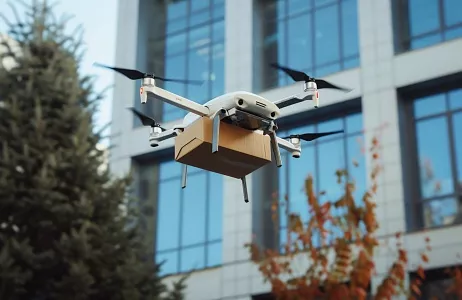Готово!
Скоро материал придет на указанную электронную почту. Также подписывайте на нас в Facebook
Ok
Russia Develops Platform For Managing Delivery Drones That Accounts For UAV Operational Restrictions
According to project manager Evgeny Mamaev, the platform’s key advantage is relieving businesses from a wide range of complex tasks. “They won’t need to build infrastructure or integrate with dozens of vendors. There’s no need to coordinate air corridors—our system does all of that. This speeds up delivery, reduces the time and cost of launching routes, and eases the burden on ground logistics,” Mamaev explained.
Customers will be able to connect to the system via API, choose the appropriate drone and delivery point, and work within a unified mechanism that links drones, drone ports, suppliers, and service providers.
When asked by CNews how the platform could be deployed under current conditions—given enemy drone attacks and restrictions on UAV operations—the developers stressed that the DronExpress architecture was designed from the start with the "closed sky" factor in mind. “This is not just software but a suite of technologies implementing the ‘seamless digital sky’ concept, which functions independently of interference, GPS, or GLONASS,” ICL Services explained.
“We selected drone models that rely on local positioning, and our ground infrastructure is built to minimize the impact of navigation interference.”
As of March 1, 2024, the nationwide ban on UAV use in Russia has been lifted. However, restrictions on drone flights remain in effect in several regions. For example, permits must be obtained for flights in prohibited zones, areas with flight restrictions, places with large gatherings of people, or where security measures are in place.
UAVs weighing over 30 kilograms must be registered, and their owners must go through an additional registration procedure. Unauthorized drone launches carry administrative or even criminal liability.
The first test launch of the platform and the drone-sharing model is scheduled for 2026–2027 in the Republic of Tatarstan, including Innopolis and Laishevo, where an experimental legal framework for drones is in effect. Commercial operation is scheduled for 2027.
Implementation will focus not on major cities, but on locations with high demand for fast delivery and limited infrastructure: ski resorts, cottage settlements, eco-farms, and vacation retreats. “These are places where people stay for short periods, where there are no pickup points, but there’s strong demand for essentials like food, hygiene products, snacks, baby supplies, or toys,” the developers explained. Delivery of medical devices and biomaterials to private clinics and public healthcare facilities has also been identified as a promising direction.
The platform’s software layer is being developed with priority given to domestic technologies (Qt, JavaScript, .NET, Python, C/C++) and full compatibility with Russian IT infrastructure. It uses SQL and NoSQL databases, CI/CD, containerization, and hybrid deployment in Russian data centers. Infrastructure details remain classified.
The project is being implemented under the Unmanned Aircraft Systems national initiative, enabling multivendor fleet management and service support. It is also in the final acceleration phase of the fourth wave of the NTI Foundation's Archipelago 2025 project and educational intensive, with 15 out of 250 projects chosen for implementation. These projects aim to achieve technological growth and scale their results.
Unmanned Aircraft Systems is a national project launched in Russia on January 1, 2024. It sets the strategy for developing unmanned aviation through 2030–2035.
The project’s goal is to create a promising independent economic sector dedicated to civil UAV development and application.
This material was prepared by Cnews.
Stay informed
Subscribe to our newsletter and keep up with our latest news

